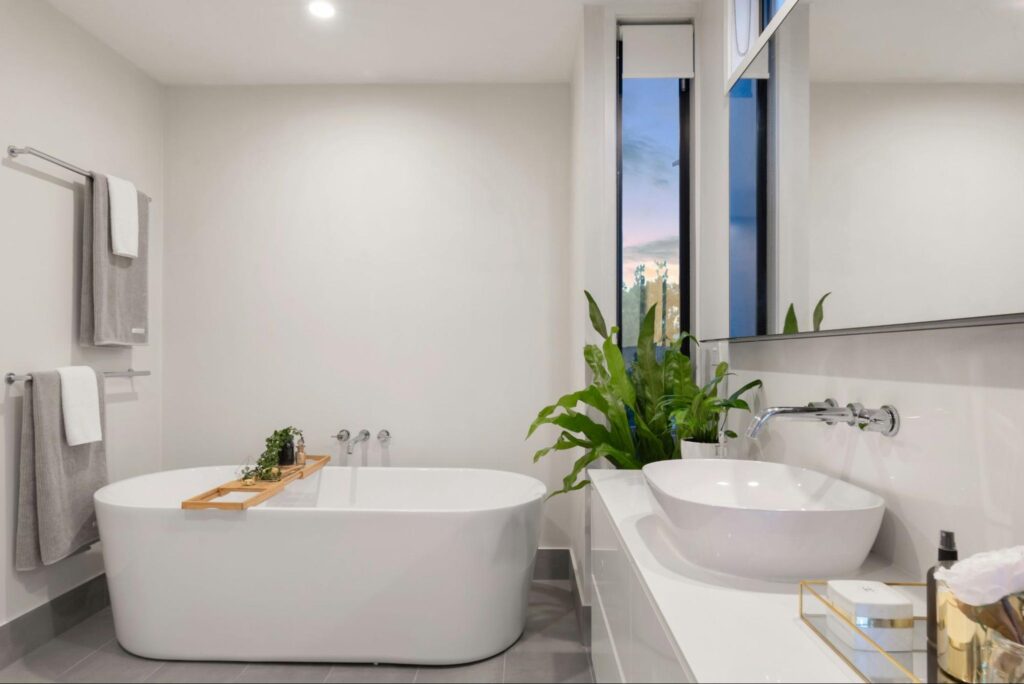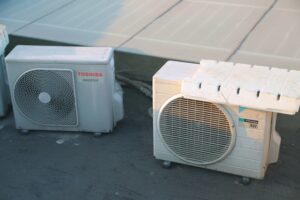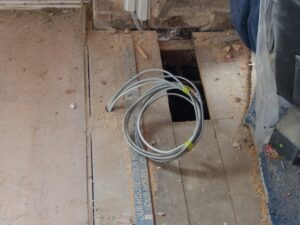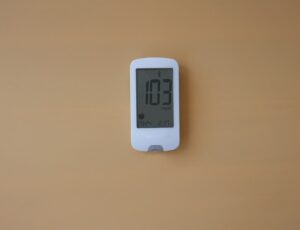A hot water heater pump is a silent hero in your home or business, ensuring hot water is always available when you need it. Ever notice how you take hot water for granted until it isn’t there?
That’s where the pump comes in, circulating the hot water from the heater to the fixtures throughout your plumbing system. But if you’re experiencing those annoying delays in hot water or noticing an unexpected hike in your energy bills, it might be a sign your hot water heater pump needs a little attention.
If you’re not sure where to start, don’t worry.
Addressing these challenges might feel overwhelming, but it’s much easier when you call in the pros.
At Excel Mechanical, we’ve got your back. With our expert HVAC and plumbing services, we focus on solutions that work for you — ensuring everything runs efficiently while saving you time, money, and hassle.
Why gamble with your comfort when professional help is just a call away?
Our skilled team specializes in delivering high-quality systems that match your needs and budget. Whether you’re managing a residential setup or a commercial space, we are here to make sure you get the best performance out of your system.
In this blog, we will cover:
- The essential function of hot water heater pumps and their types
- How these pumps save you energy, water, and money
- Easy installation and maintenance tips for a long-lasting system
Let’s break it down!
Understanding Hot Water Heater Pumps
Hot water heater pumps ensure you have instantly accessible hot water. They circulate hot water from the heater to the fixtures and back, creating a loop that reduces water waste and improves convenience.
There are different types depending on design and power source, with key components that make this process possible.
Function of Hot Water Heater Pumps
Hot water heater pumps eliminate the wait time for hot water at your faucet.
These pumps ensure hot water is always available by creating a continuous loop between your water heater and fixtures.
This function saves time and conserves water, making it ideal for eco-conscious households. It’s highly beneficial in large homes where faucets can be far from the heater, causing delays in hot water delivery.
This can enhance comfort and efficiency, providing a reliable supply whenever needed.
Types of Hot Water Heater Pumps
There are primarily two types: dedicated return line pumps and under-sink retrofit pumps.
Dedicated return line pumps require an extra pipe to return unused hot water to the heater. They are perfect for new constructions where additional plumbing isn’t an issue.
Under-sink retrofit pumps are installed under sinks, effectively fitting existing systems without major changes. They might be slower but are cost-effective and convenient for homes without a dedicated return line.
Each type has its benefits, depending on your plumbing setup and budget.
Components and Design
Key components of hot water heater pumps include a pump motor, check valve, and thermostat. The pump motor ensures continuous water flow, while the check valve prevents backflow, maintaining a stable water loop. A thermostat controls the water temperature, keeping it within a set range for optimal performance.
The design is compact and efficient, suitable for most plumbing systems. This ensures straightforward installation and minimal maintenance.
Benefits of Using Hot Water Heater Pumps
Hot water heater pumps offer several advantages that can significantly benefit homeowners and businesses. These benefits include improved energy efficiency, cost savings, and water conservation.
Energy Efficiency
Hot water heater pumps are designed to be more energy efficient than traditional water heaters. They work by transferring heat rather than generating it, which requires less energy. This technology allows you to heat water using less electricity or gas.
The efficiency of these pumps helps reduce the overall energy consumption in your home, leading to lower utility bills.
If you prioritize sustainable choices, using a hot water heater pump can significantly reduce your carbon footprint.
Cost Savings
Installing a hot water heater pump can lead to substantial cost savings. These systems typically have a longer lifespan and require less maintenance, saving you money on repairs and replacements.
Additionally, the reduced energy use directly translates into lower monthly energy bills. Over the years, these savings can add up, making the initial investment in a hot water heater pump worthwhile for many homeowners.
Water Conservation
Water conservation is another key benefit of hot water heater pumps.
They provide hot water more quickly and efficiently, reducing the water wasted while waiting for it to heat up. This efficiency helps conserve water resources, benefiting the environment and your water bill.
For those committed to sustainable practices, choosing a hot water heater pump supports efforts to use water resources wisely.
Installation Process
Understanding how to install a hot water heater pump properly is important for efficiency and safety. Key steps include choosing the right pump and following a precise installation method while avoiding common mistakes.
Selecting the Right Pump
Choosing the correct pump is crucial for optimal performance.
- First, consider the size of your water heater and the flow rate needed for your home.
- Pumps come in different capacities, so selecting one that matches your system’s needs ensures efficiency.
- Look for energy-efficient models to save on electricity costs. Also, make sure the pump is compatible with your existing plumbing system.
- Consider the brand’s reputation and warranty.
Step-by-Step Installation Guide
Start by gathering the necessary tools, such as wrenches, pipe cutters, and Teflon tape.
Follow the manufacturer’s instructions carefully. First, turn off the power supply and water valve. Then, remove the old pump if necessary.
Position the new pump at a level spot to prevent strain on the piping. Ensure all connections are secure using Teflon tape to prevent leaks. After connecting, restore the power and water supply, check for leaks, and ensure the pump operates smoothly.
Testing the system before completing the installation is crucial. Listen for unusual noises and monitor the pressure. If something seems off, review all connections. Completing these steps with care ensures a successful installation.
Common Installation Mistakes
One common mistake is not correctly sizing the pump, leading to inefficiency and potential system strain. Always double-check the size and capacity needed for your setup. Another error is failing to tighten fittings, which can cause leaks and damage.
Skipping steps like testing the system post-installation can result in problems going unnoticed. Properly securing both electrical and water connections is crucial for safety and functionality.
Maintenance and Troubleshooting
Regular maintenance and quick troubleshooting of your hot water heater pump can save you time and money. These practices ensure efficiency and extend the life of your system.
Routine Maintenance Tasks
Proper maintenance is key to keeping your hot water heater pump running smoothly. Check and clean the filter regularly to ensure optimal performance. Sediment buildup in the tank can reduce efficiency, so flushing the tank once or twice a year is crucial.
Inspect the anode rod every few years for corrosion. If it looks rusted, replace it to prevent tank damage. This small step can protect the interior lining of the tank and prevent leaks. Lastly, verify the pressure relief valve is working.
Lift the valve and let it snap back; a burst of water should be released. If not, it might be time for a replacement.
Troubleshooting Common Issues
You might occasionally encounter issues like insufficient hot water or noises from the unit.
If you have insufficient hot water, consider checking the thermostat settings and adjusting them if they are too low. If noise is a problem, it might be caused by sediment in the tank. A manual tank flush can fix this.
No hot water at all? This can indicate a malfunction in the heating elements or a tripped circuit breaker. Resetting the breaker is a quick fix, but if the problem persists, a closer look at the elements is necessary.
Regular checks can help spot these issues before they escalate.
When to Seek Professional Help
While you can handle some maintenance and troubleshooting tasks, there are times when professional help is the best option.
If you notice leaks around the tank or if the water is discolored or has an unusual odor, it’s time to seek expert assistance.
Excel Mechanical shines in providing top-notch HVAC and plumbing services. With our exceptional quality and great value, we cater to both residential and commercial needs. Our team works to deliver the best system tailored to your requirements and budget.
Remember, tackling complex issues yourself can sometimes lead to bigger problems. Professional help ensures your system runs safely and efficiently.
Advancements and Innovations
Recent advancements in hot water heater pumps focus on smart technology and sustainable solutions.
These developments aim to enhance efficiency, save energy, and provide greater convenience for users. Smart pumps and eco-friendly technologies are at the forefront, offering modern and cost-effective options.
Smart Pumps and Automation
Smart pumps introduce high-tech features that improve the control of hot water systems.
They allow you to adjust settings through mobile apps, providing convenience at your fingertips. This technology supports real-time monitoring, alerts, and remote adjustments, making management easy and efficient.
These pumps can also optimize performance based on usage patterns, saving energy. By learning your habits, they heat water only when needed, reducing waste.
Sustainable Technologies
Sustainable technologies are becoming a key focus.
These include heat pump systems that use minimal electricity by transferring heat from the air or ground. They offer an energy-efficient alternative to traditional heaters and help lower utility bills.
Solar-assisted pumps are another innovation. They use solar energy to complement heating needs, reducing reliance on traditional power sources. This technology is ideal for those looking to reduce their environmental footprint.
Regulations and Standards
When installing a hot water heater pump, it’s essential to consider building codes and energy efficiency ratings. Regulations ensure safe installation and operation, while efficiency standards help you save on energy bills.
Building Codes and Compliance
When installing a hot water heater pump, you must follow local building codes. These codes are designed to ensure the safety and efficiency of your heating system and cover various aspects such as placement, materials, and proper ventilation.
Hiring professionals can help you navigate these regulations. We provide expert guidance to ensure compliance with all relevant codes. Non-compliance may result in fines or require you to make adjustments, which can be costly.
Therefore, it’s crucial to be aware of the specific requirements in your area.
Energy Efficiency Ratings
Energy efficiency ratings indicate how effectively a hot water heater pump uses energy.
These ratings are represented by a star system or an annual fuel utilization efficiency (AFUE) percentage. A higher rating means the device consumes less energy, lowering operational costs.
Choosing a pump with a high-efficiency rating can significantly reduce your utility bills. Understanding these ratings can help you make a more informed decision, ensuring both economic and environmental benefits.
Environmental Impact and Sustainability
Hot water heater pumps are designed to minimize energy use and promote sustainability. They help reduce carbon emissions and ensure responsible manufacturing practices.
Reducing Carbon Footprint
Hot water heater pumps use technology that reduces energy consumption. By using electricity more efficiently, they release fewer greenhouse gases than traditional methods, leading to a healthier planet.
By choosing energy-efficient models, you can lower your carbon footprint. This means using less energy, which is good for the environment and your energy bills.
Sustainable Practices in Manufacturing
Manufacturers now focus on creating eco-friendly hot water heater pumps. They use sustainable materials and processes that minimize waste and pollution.
Many factories aim to be energy-efficient, cutting down on emissions during production. This makes the products more sustainable from start to finish.
Our commitment ensures you receive reliable, eco-friendly solutions tailored to your needs and budget.
Choosing the Best Hot Water Heater Pump
When selecting the best hot water heater pump, you should focus on key aspects such as energy efficiency and capacity. You should also compare different brands and models to determine which suits your specific needs and budget.
Factors to Consider
The first thing you should evaluate is the pump’s energy efficiency.
An energy-efficient model helps reduce utility bills and is more environmentally friendly. Look for pumps with good efficiency ratings to ensure cost savings over time.
Next, consider the capacity. Make sure the pump can handle your home’s hot water demand. A pump with higher capacity might be necessary for larger households. Always check the specifications and match them with your needs.
Also, consider the maintenance requirements. Some models are easier to maintain, which could save you time and service costs. Ask about the warranty coverage as well, as it can provide peace of mind by covering repairs or replacements if needed.
Brand and Model Comparisons
Excel Mechanical stands out for its exceptional quality and value when comparing brands and models. You can trust our experienced professionals to help you choose the right hot water heater pump. We offer a range of options tailored to fit individual needs and budgets.
Look for pumps from well-known manufacturers with a history of reliability. Read customer reviews to learn about performance and any potential issues. Customer feedback can be a helpful indicator of long-term satisfaction.
It’s essential to compare each brand’s warranty and support services.
Frequently Asked Questions
Dealing with hot water heater pumps might seem daunting at first, but once you get the hang of it, the benefits are undeniable. Whether you’re looking to install one, troubleshoot an issue, or just curious about how to make the most of it, we’ve got you covered with some common questions and answers.
How do you replace a hot water heater pump?
Replacing a hot water heater pump involves a few steps. First, turn off the power and water supply to the heater. Then, disconnect the existing pump by removing the plumbing connections. After that, install the new pump by following the reverse steps and ensuring all connections are secure and leak-free.
What are the benefits of a hot water recirculating pump?
A hot water recirculating pump provides instant access to hot water, reducing the time you wait for the water to heat up. This helps save water and energy, making it an eco-friendly choice. It’s a great option for those looking to increase home comfort and efficiency.
What are the signs that a hot water recirculating pump is failing?
Unusual noises, reduced water pressure, or visible leaks can indicate a failing pump. If the water takes longer to heat up, that might also indicate a problem. Regularly checking your pump for these issues can help prevent further damage.
What is involved in installing a recirculating pump for a tankless water heater?
Installing a recirculating pump for a tankless water heater involves a few steps. First, connect the pump to the water lines and integrate it into the heater’s system. It’s crucial to follow the manufacturer’s instructions to ensure proper installation, which can improve efficiency and performance.
How does a hot water heater pump improve system efficiency?
A hot water heater pump improves system efficiency in a few ways. First, it reduces the time it takes for hot water to reach your taps. This decreases water waste because less water is run down the drain waiting for it to heat. It also reduces energy use, as the system steadily keeps water at the desired temperature.
What should be considered when choosing the best hot water recirculating pump?
When choosing a recirculating pump, consider factors like size compatibility with your system, energy efficiency, and noise levels. Look for pumps that fit your budget and needs while offering long-term reliability.




